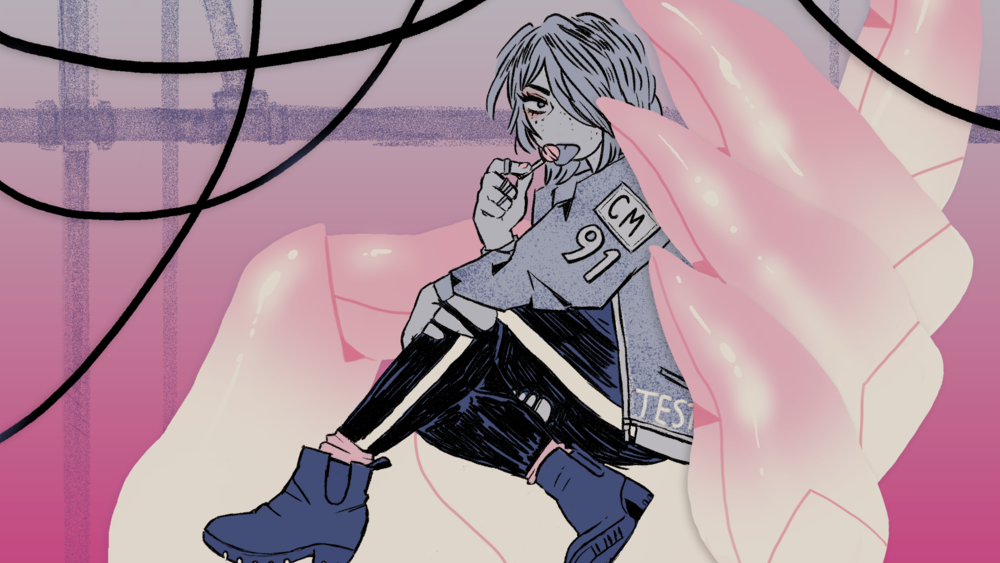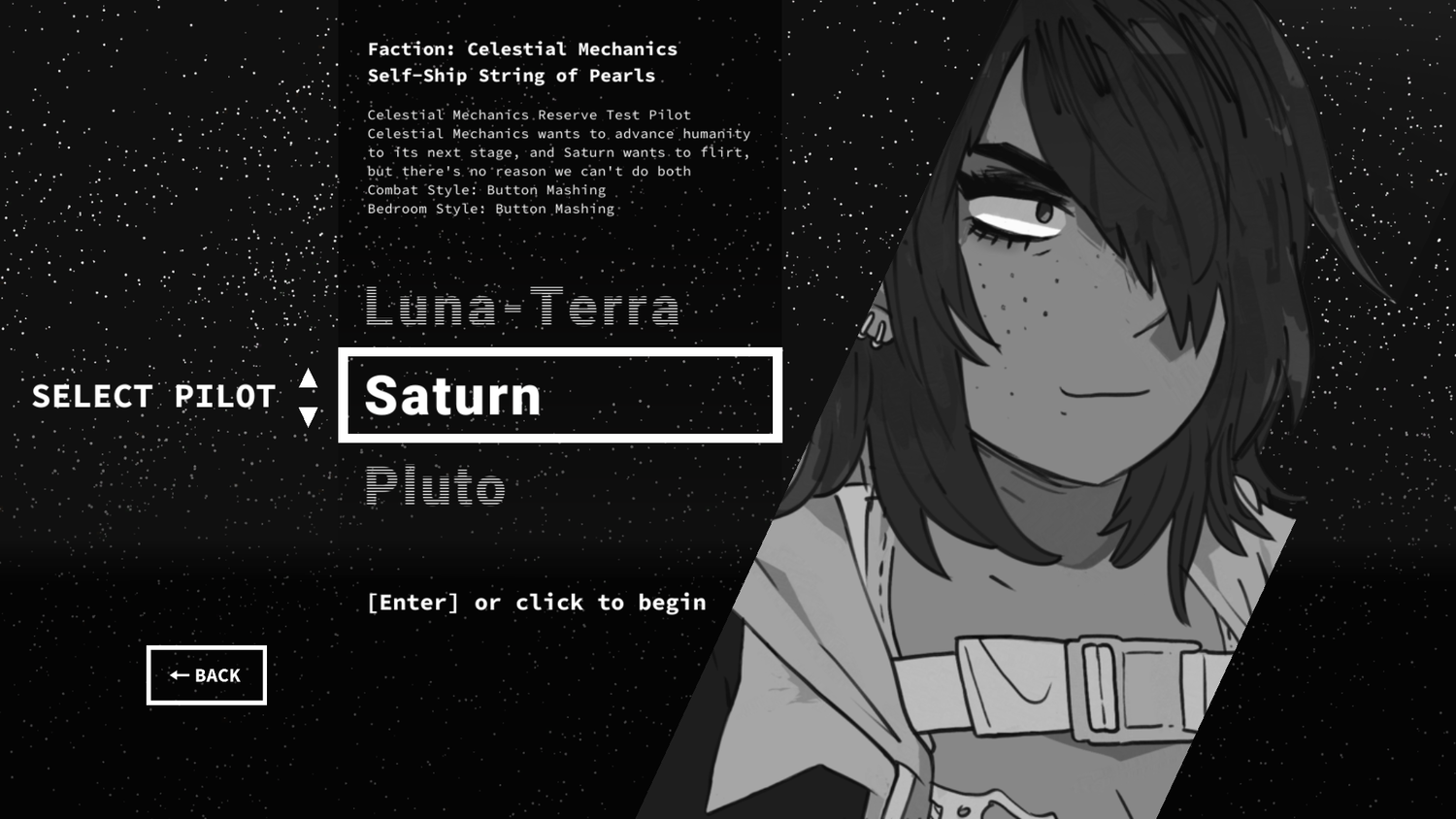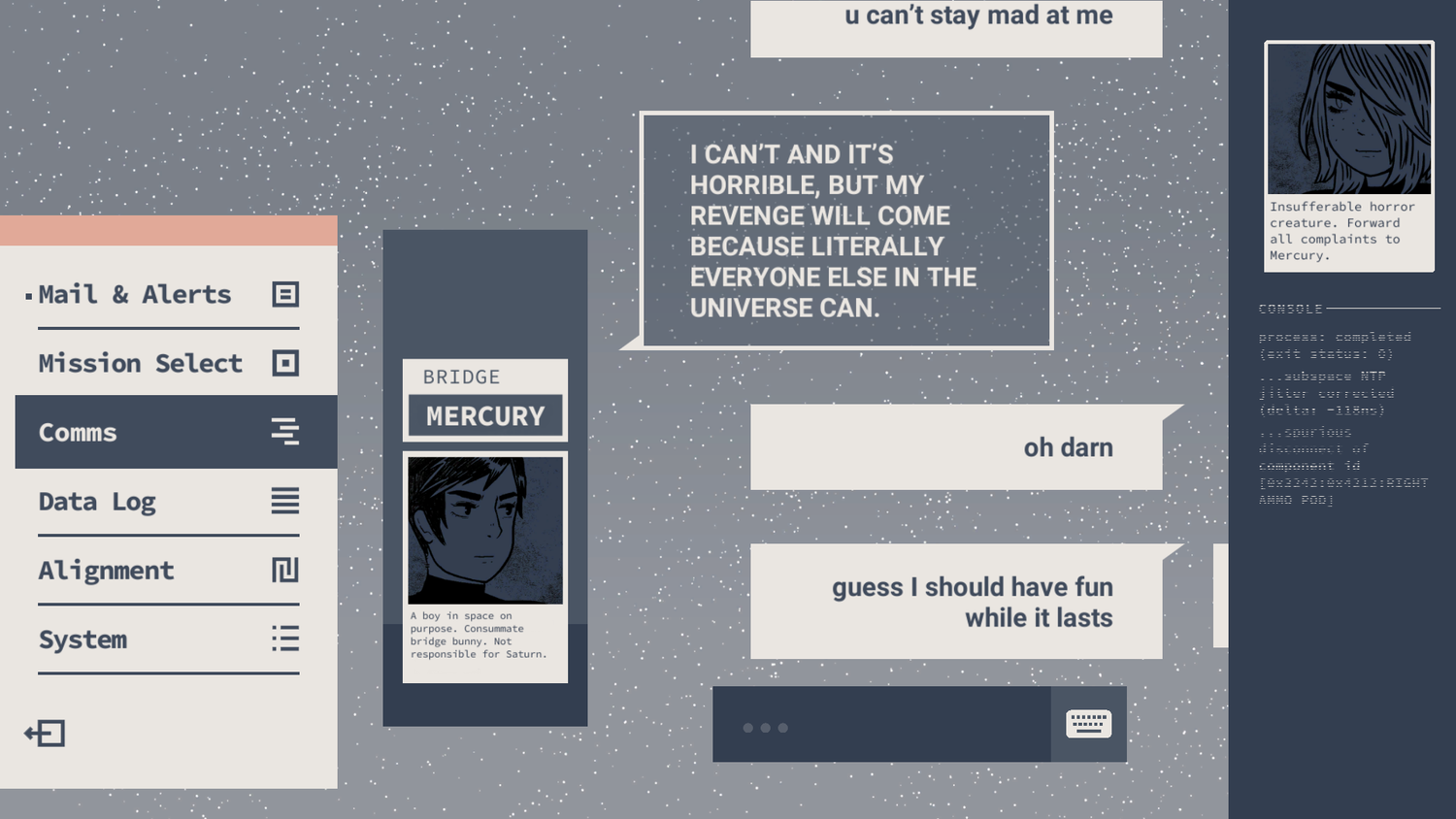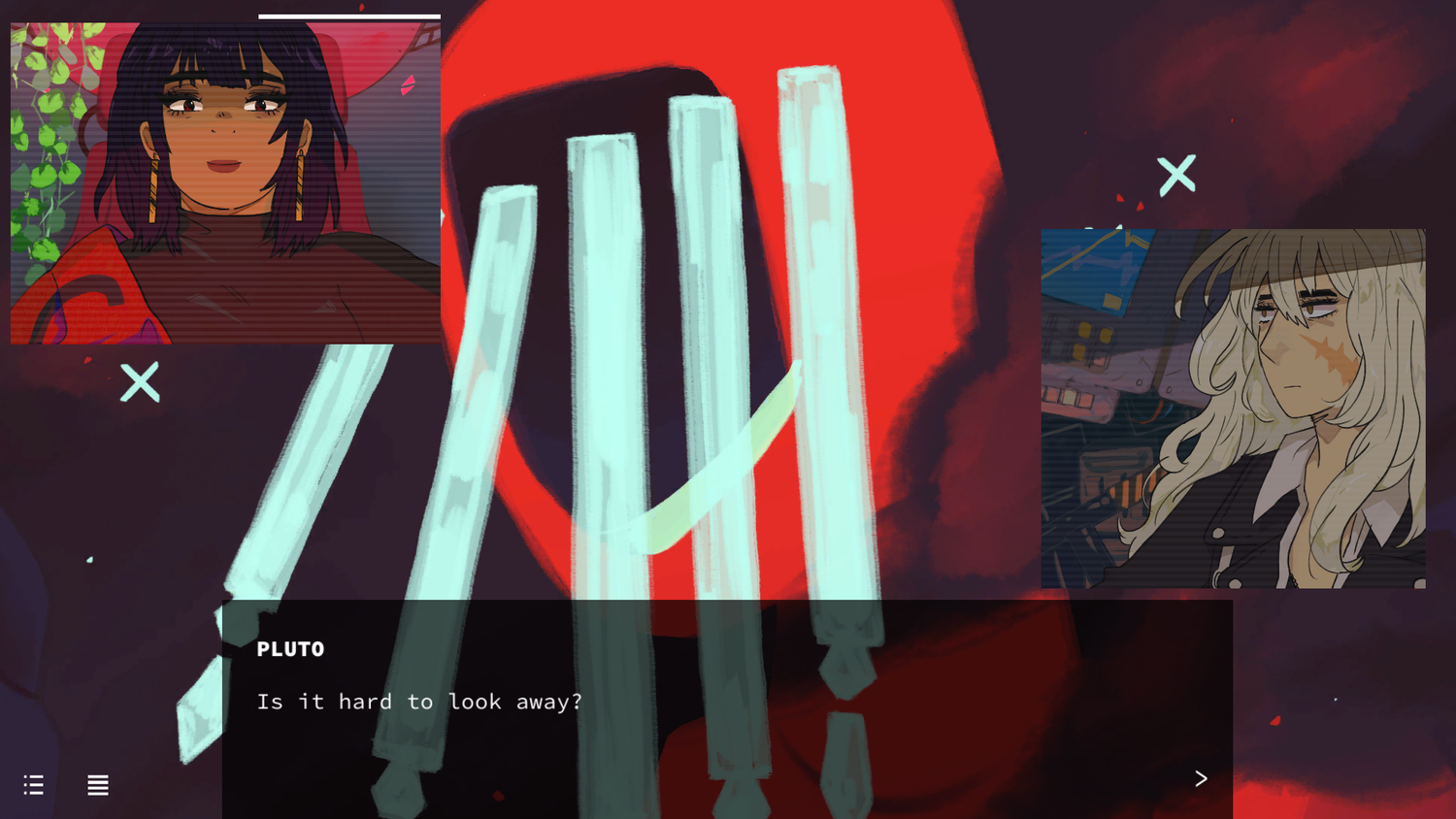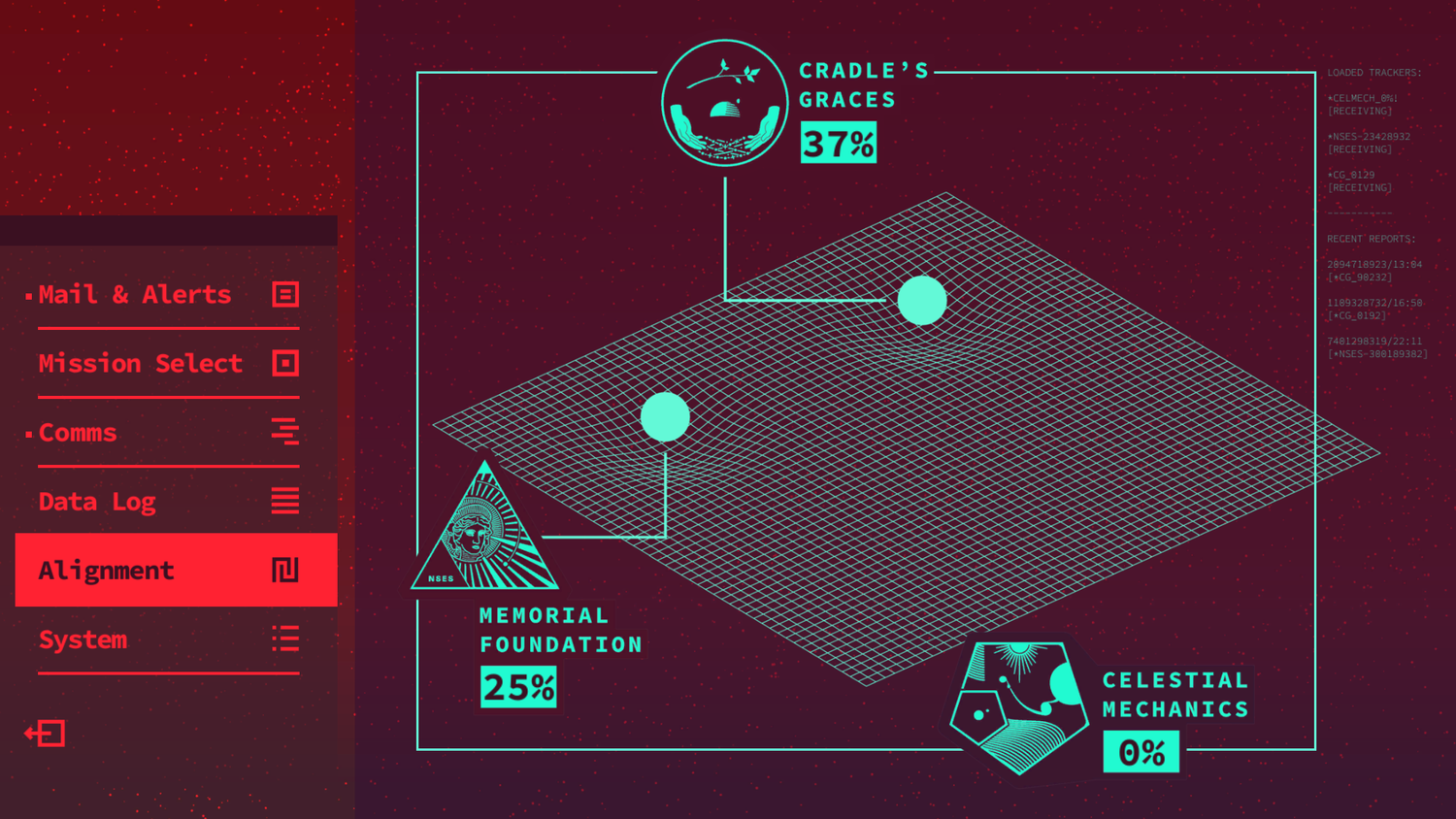It is undoubtedly difficult to blame anyone for being adverse to particular video game genres—everyone will have their tastes, and it is valid to not take to specific titles knowing that you likely won't like it at its core. For me, one of the several genres I've never given a chance to is the visual novel. I want to play games for the interactive elements, and this form of video game seemed like the opposite of what I wanted. But I couldn't turn my eyes away from everything I was hearing and seeing of Heaven Will Be Mine.
A Sci-Fi visual novel with story elements of queerness, romance, and the frontier of space, this marked all of the checkboxes of games that I was looking for, and could not find at the time. Still, the genre pushed me away, and I found myself just admiring the project from afar. But after I had a chance encounter with a developer from Pillow Fight Games at Flame Con, resulting in me obtaining a Steam code for the game, I found that I now had no excuse not to try it.
I made some assumptions about what I would be in for when I first started up the game: I expected a lot of text to read, static images of character portraits against nice artwork, and loops of music that I would likely enjoy. And while my assumptions about Heaven Will Be Mine turned out to be true to some degree, I was surprised by how immersed and engrossed I was by the world created by these elements that I previously denigrated.
Much of it has to do with the solid writing, which fleshes out both the lore and the inward characterization of the characters, but the visual presentation did much to enhance the script in a way that captivated me. Players can choose between three main characters: Saturn, Pluto, and Luna-Terra, all representing three different factions. Celestial Mechanics, Cradle's Graces, and the Memorial Foundation, represented by the three characters respectively, were tangled in a conflict that I found fascinating.
Space may be considered to be the final frontier, but not to the pessimistic Memorial Foundation—with an abstract "Existential Threat" looming from a "Cold War," this faction is hellbent on staying grounded on Earth. Cradle's Graces is looking to transcend that, with the opportunistic Celestial Mechanics taking advantage of resources while the other two factions squabble. Anyone off Earth is considered by the Memorial Foundation to be "less than 100% human." Most fiction either romanticizes space or demonizes it, and seeing different groups representing these different views in one story is an original angle that I loved.
[pullquote]"And while my assumptions about Heaven Will Be Mine turned out to be true to some degree, I was surprised by how immersed and engrossed I was by the world created by these elements that I previously denigrated."[/pullquote]
I ended up choosing to play as Saturn in my first playthrough, and despite all of the sci-fi elements, I found her plight and characterization to be relatable. Saturn has attitude and a rebellious nature to her, and even without voice acting and full animations, her personality came through. Besides text boxes, most character interactions and moments were presented through console commands and instant messaging conversations.
Without being a traditional "first-person" video game, there was still something about this presentation that made it feel like a first-person experience. The chat between Saturn and the character of Mercury sounded authentic for someone roughly my early-20s age. Voices are clear, even from something as simple as the use of punctuation and capitalization. Simply put, Saturn is a rebel, a double-crosser, and personality-wise is what us young 'uns call a "hot mess." My choice of protagonist pulled me even further into this world.
The audio portion of this visual novel tied these immersive aspects together—with my lack of experience in the genre, I positively related the use of sound and sound effects as listening to a cool audio or radio play. It pulled similar tricks from other Sci-Fi pieces of fiction, from droning noises to utterly hypnotic electronic music. While most of Heaven Will Be Mine consisted of me reading text, the sound design and music succeeded in augmenting the mood that the game aimed for.
[pullquote]"Without being a traditional "first-person" video game, there was still something about this presentation that made it feel like a first-person experience."[/pullquote]
The meat and potatoes of Heaven Will Be Mine was the character interactions, and the choices the player makes in the game. As Saturn, I found myself going on several missions that would have me encounter either Pluto or Luna-Terra—all three of these characters are operating under their agendas for their respective factions. Where the choices come into play is how you will handle these encounters—binary options will let you choose between an action that will help your faction or an intentional act that is at the expense of your faction. There is an alignment system in this game, based on these choices. Depending on where you align by the end of the narrative, which lasts eight in-game days, you will receive one of multiple endings.
These three characters are pilots of different Ship-Selves, essentially mechas. Those of you who haven't been following this game may be surprised by the tone of these encounters, which are entirely dominated by non-stop flirting. Yes, Saturn, Pluto, and Luna-Terra all engage in combat with each other, but the way in which these interactions are described has a sexually-charged energy to it—fighting is a metaphor for intimacy, until that intimacy eventually becomes literal.
And even through flirtatious dialogue, the world-building and characterization still comes out during these encounters. These characters all have a shared history before the events of the game, and though I initially believed that my choices would be based on my opinions on the main factions of the story, I eventually became so entranced with the character interactions to the point where they dictated my decisions. The game, at least to me, became about personal relationships in the midst of an epic conflict, and how far one can go for these relationships.
[pullquote]"Yes, Saturn, Pluto, and Luna-Terra all engage in combat with each other, but the way in which these interactions are described has a sexually-charged energy to it...."[/pullquote]
But that isn't to say that I still have doubts with the form of the visual novel. While I admired the artwork, there were times where I felt frustrated that much of the action was left to my imagination—I had difficulty understanding the point of visual novels if many of the visuals were abstract. Minimalistic shapes and colorful backdrops certainly helped, but I still wondered what cool concepts like an "oxygen ocean" would look like. I would have liked to see a better visual representation of what Ship-Selves combat would look like, even if it was just all smoke and mirrors.
In the end, all of the parts that struck home with me were dependent on the flowery prose of the game's writing. I enjoyed how the narrative deconstructed the very concept of a mecha suit, questioning the practicality of it. The theme of shape and form, and how mecha acts as a different body for the user, was one that I wasn't used to seeing in the sci-fi that I have personally digested, and one that I was happy to absorb. Heaven Will Be Mine is about the uniqueness of love in space, and it deconstructed sci-fi tropes that I was all too used to.
The overtly romantic angle for Heaven Will Be Mine will be a turn-off for many, but my experience has led me to believe that inevitably, there must be a visual novel for everyone. For me, it happened to be this off-beat space dystopian adventure. Yes, there will be a lot of reading that comes with the genre—but if you choose the right one for you, and let the story capture you, you may find yourself immersed in the same way you would with any other video game.

